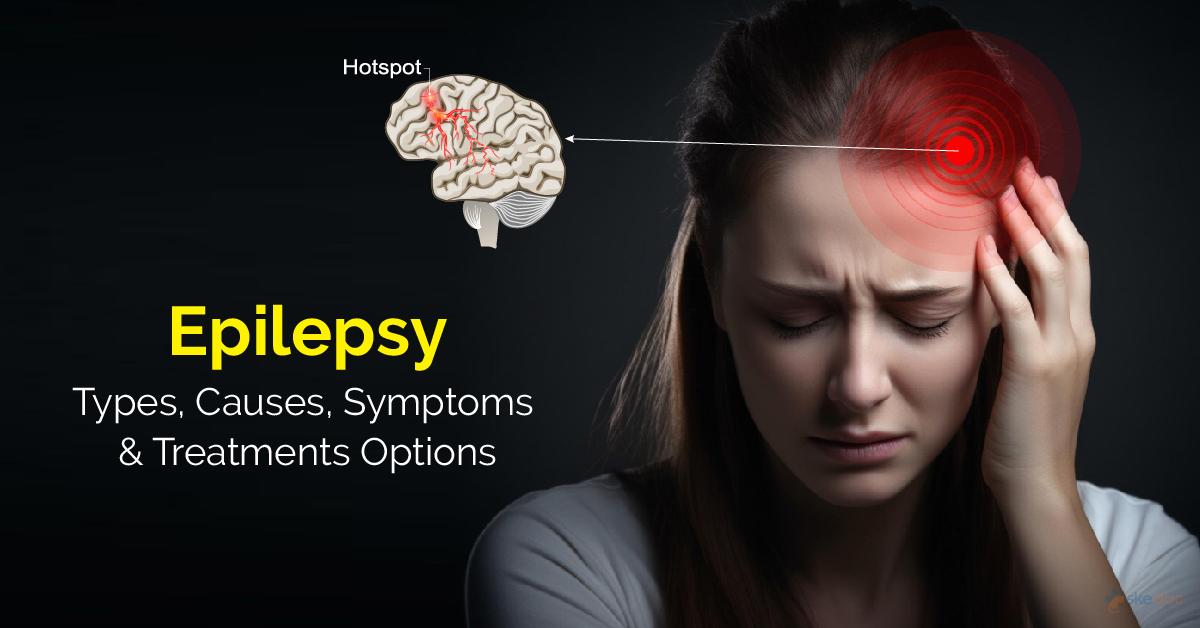Allergy
Blood Diseases
Bone & Joints
Brain
Cancer
Child Care
Cosmetic Surgery
Diabetes
Endocrinology
ENT
Eye
Gen Medicine
General Surgery
Heart
Kidney
Lifestyle
Liver & Digestive
Lung
Men’s Health
Mental health
Physiotherapy
Rheumatology
Skin and hair
Sleep Disorders
Spine
Transplant
Women Health
Thyroid
Vascular Surgery
Epilepsy

What is Epilepsy?
Epilepsy, also known as seizure disorder, is a neurological disorder characterized by recurrent, unpredictable seizures resulting from abnormal electrical activity in the brain. These seizures can last from a brief period to long periods with vigorous body shaking, unusual behaviours, and sometimes loss of consciousness.
Is Epilepsy a medical emergency?
Epilepsy is a medical emergency.
Types
There are two types of seizures:
- Generalized seizures: Generalized seizures affect the whole brain. Characteristics include muscle twitching, shaking hands and feet, biting of the tongue, and losing consciousness. It also involves muscle stiffness, loss of muscle control, loss of bladder or bowel control, and performing repetitive movements like eye blinking, lip-smacking, chewing, etc. There are six main types of generalized seizures:
- Tonic-clonic seizures
- Tonic seizures
- Clonic seizures
- Myoclonic seizures
- Absence seizures
- Atonic seizures
- Focal seizures: Focal or partial seizures affect only one side of the brain. Focal seizures are further divided into:
- Simple partial seizures: This kind of focal seizure does not lead to loss of consciousness. They involve changes in vision, hearing, and smell. It also results in dizziness and involuntary jerking of arms and legs.
- Complex partial seizures: This kind of focal seizure does lead to loss of consciousness or impaired awareness. It also involves staring blankly into space, being unresponsive, and performing repetitive movements.
Causes
Epilepsy can be caused due to the following reasons:
- Genetic abnormalities
- Brain trauma or head injury
- Stroke
- Brain tumors
- Infectious diseases of the brain, such as meningitis and encephalitis
- Prenatal brain damage problems
Risk factors
Factors that increase the risk of developing epilepsy include the following:
- Prior family history of epilepsy
- Chronic alcohol use
- Head injuries
- Brain infections such as meningitis or cerebral malaria
- Stroke
- Brain Tumors
- Central nervous system disorders like multiple sclerosis or tuberous sclerosis
- Developmental disorders such as cerebral palsy and autism
Triggering factors
Factors that can bring on an episode of seizures include:
- Noncompliance with medications
- Fever
- Stress and tiredness
- Lack of sleep
- Caffeine and alcohol
- Bright lights or flashing lights
- Certain food ingredients
- Skipping meals or overeating
Symptoms & signs
Signs and symptoms of epilepsy include:
- Staring into space
- Jerking movements of hands and feet
- Muscle stiffness
- Biting of the tongue
- Dizziness and passing out
- Loss of bladder or bowel control
- Changes in sense of taste, smell, vision, and hearing
Investigations
Investigations that are performed to diagnose epilepsy include the following:
- Neurological examination
- Blood tests to check for infections and genetic conditions
- Electroencephalogram and high-density EEG to determine brain activity
- Imaging tests like MRI, CT scan, and functional MRI
- PET scan and SPECT test
- Neuropsychological tests to assess memory, thinking, and speech skills
Other investigation tests are performed to determine the area of seizure onset and the affected part of the brain. They include:
- Statistical parametric mapping (SPM)
- Curry analysis
- Magnetoencephalography (MEG)
Diagnosis
The diagnosis depends upon the neurological examination and the results of the investigation tests. Depending upon the type of seizure and its underlying cause, it can be further classified.
Differential diagnosis: Other conditions that can cause similar symptoms of epilepsy are:
- Syncope
- Narcolepsy
- Hyperventilation
- Migraines
- Panic attacks
- Psychogenic non-epileptic seizures
Treatment options
Medical treatment
Medications that are administrated in the treatment of Epilepsy are anti-epileptic medications. Other medications are also given in combination with anti-epileptic medications. The appropriate combination and dosage of the medications depend upon many factors like age, frequency of the seizures, intensity of the seizures, and other medical conditions of the individual. If no further episodes of seizures are experienced, the medications can be discontinued gradually.
Interventional treatment including surgery and indications for surgery/ Surgical treatment
On failure of medical treatment, surgery is recommended in treating epilepsy. A minor part of the brain that causes seizures is removed. Surgery is done in case of focal seizures where only a part of the brain is affected and if the affected part does not interfere with vital functions like vision, speech, hearing, and motor function.
Other therapies for controlling seizures include:
- Vagus nerve stimulation therapy: Alternative to surgery, vagus nerve stimulation therapy is also recommended. A device called a vagus nerve stimulator is implanted under the skin in the chest to control seizures.
- Deep brain stimulation: In this therapy, electrodes are implanted in a specific part of the brain and are connected to a generator placed in the chest or skull. The electrodes transmit electrical pulses to the brain to control seizures.
Role of Diet/ Exercise/ Lifestyle changes/ Preventive measures
Non-medical roles of diet in epilepsy include:
- Ketogenic diet: A diet consisting of foods high in fats and low in carbohydrates to help control seizures.
Lifestyle modifications include the following:
- Be compliant with medications
- Do not self-discontinue medications without consulting a physician
- Seek medical advice before starting any other medications or herbal products
- Avoid activities like driving or operating heavy machinery
- Exercise to maintain physical health
Complications
Epilepsy can lead to certain complications, such as:
- Physical injury from falls can include bone fractures
- Injury from tongue bites
- Inability to drive or operate heavy machinery
- Increased possibility of drowning while swimming
- Learning disabilities and lower educational achievements
- Poor employment outcomes
- Emotional distress with social isolation and disability
- Psychological complications such as depression and anxiety
- Complications during pregnancy for both mother and fetus
- Brain damage
- Death
Prognosis
The overall prognosis of Epilepsy is good. About 60% to 70% of the cases are controlled effectively with medications.
When to contact the doctor? / How to identify complications?
A medical consultation is recommended when seizures are recurrent, lasting more than five minutes, and are associated with difficulty breathing, loss of consciousness, and a physical injury.
Indications for hospitalization
Epilepsy requires hospitalization depending upon the frequency and intensity of the seizures and the individual's medical condition.
Suggested clinical specialists/ Departments to consult for this condition
- Neurology
Was this article helpful?
YesNo




